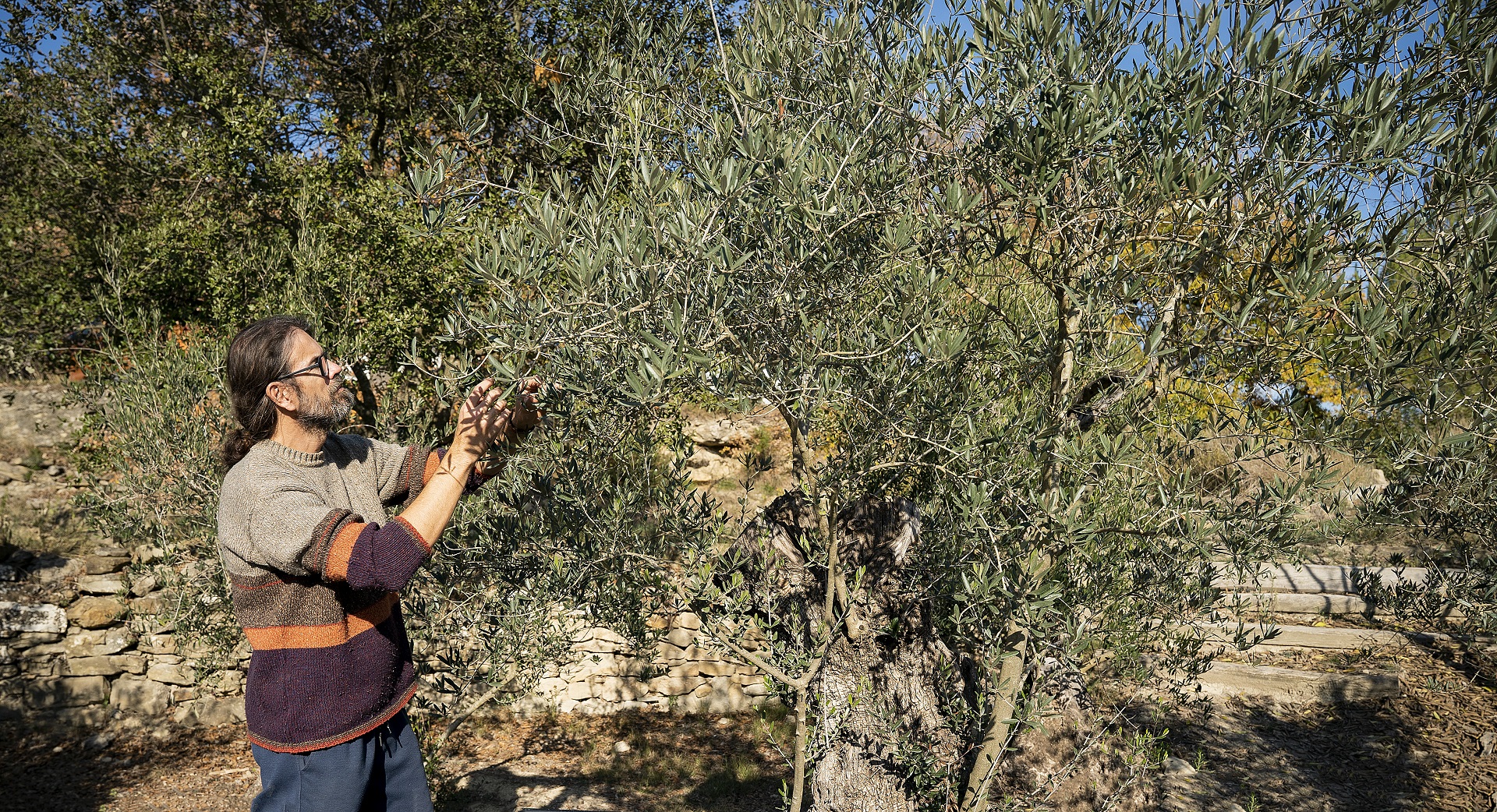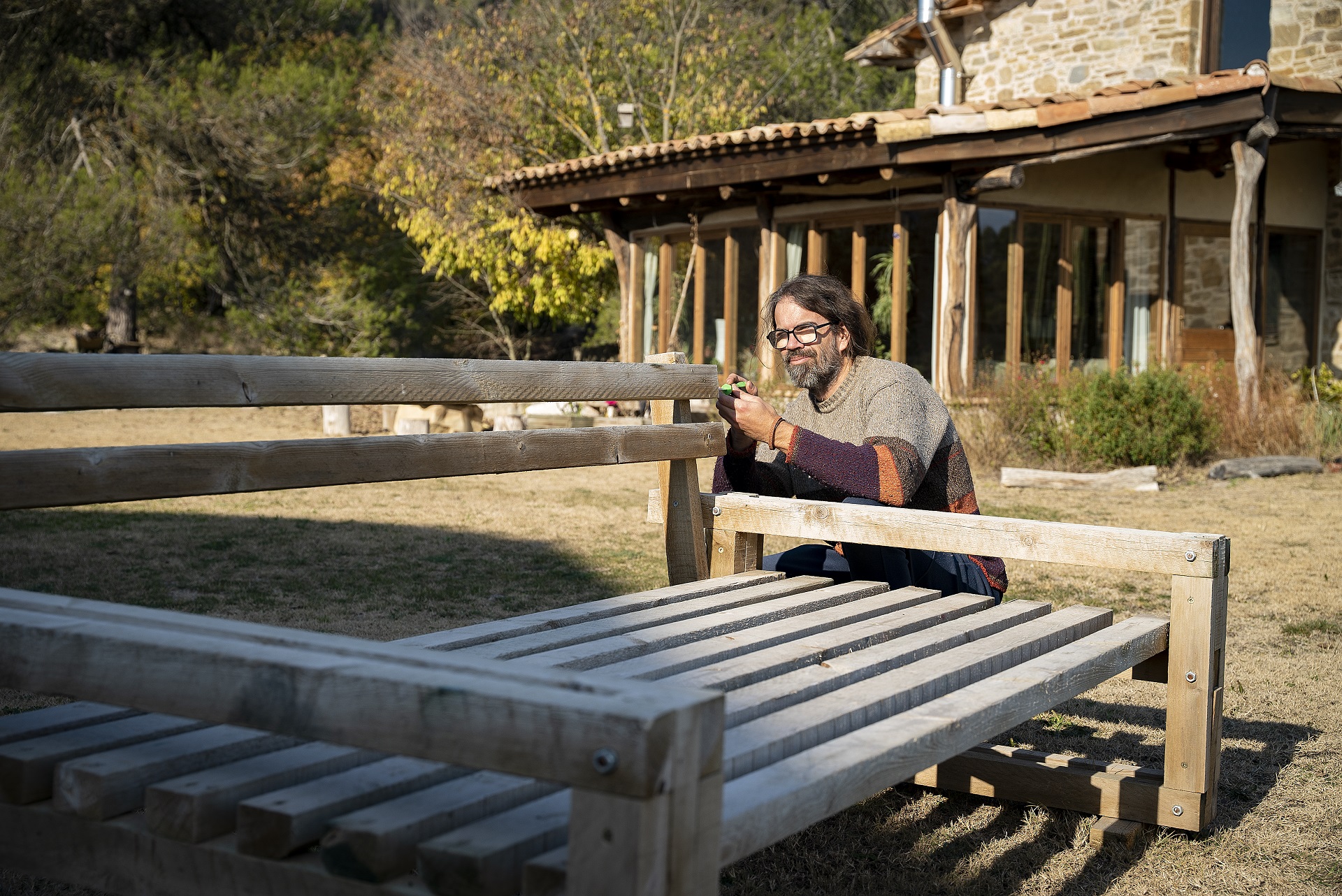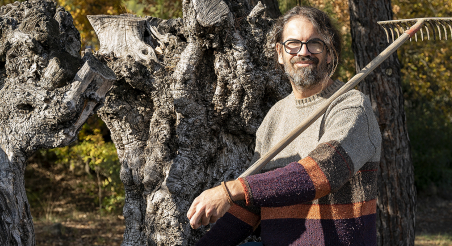Natxo Tarrés (Manresa, 1974) led the rock group Gossos for many years and today continues to be passionate about music, an art that allows him to express himself and connect with his emotions. But creative concerns have taken him beyond the cultural world, and now he has several projects on his plate.
Very aware of the need to find new solutions to the challenges of the 21st century, he opens the doors of Irehom, a shared workspace he co-founded in the Montserrat Rural Park, which is featured in the new short film of the 'BCN Smart Rural Stories'.
What is Irehom?
Irehom is the acronym for the Holistic Research Institute of Montserrat, a non-profit association that was born almost eleven years ago thanks to the initiative of a group of friends from Manresa and its surroundings. We wanted to work together on a project that tried to collectively address some questions we were asking ourselves individually.
What worried you the most?
The future perspective that awaited us if we did nothing. In 2008, it was very evident that the system was faltering, and things happening on the other side of the world were affecting us directly. We felt that we had to better safeguard our lives and our territory, and we decided to create a kind of school of experiences that would allow us to experiment and see which tools really worked. Together, we agreed to buy Can Casassaies, a large vineyard that had fallen into disuse with the arrival of phylloxera and the Industrial Revolution, and establish Irehom there.
As a project that seeks creative responses to the challenges of the future, what aspects have you focused on since your foundation?
Above all, we have learned to work voluntarily on things that no one forces us to do but we feel are our responsibility; in this sense, we have learned how cooperation between people works and how we need to organize ourselves to achieve our goals. As more concrete actions, we have installed renewable energy, designed a water capture system, created a permaculture project, and developed a strategic plan for the development of this valley, among many other initiatives that have allowed us to learn, enjoy, and take responsibility for our own decisions. But we don't want to be just a beautiful and unique project: at Irehom, we want to transform reality. So, we have dedicated many efforts to try to ensure that what we do transcends and inspires other collectives.
The attitude of constant learning seems to be a fundamental characteristic of the people who are part of your space. Is that so?
Yes, in fact, the project is conceived as a school because we are clear that continuing to do things in the same way will only worsen the problems. Continuing to live in a model of unlimited growth in a world that is limited can only lead us to collapse. My ten-year-old son has it very clear, but society in general doesn't seem to, as it doesn't seriously consider the challenges it faces. What makes us so asleep that we can't see that the world cannot continue in the same way? I think the first thing we need to do is unlearn what we know, and then learn what we should know.
«Continuing to live in a model of unlimited growth in a world that is limited can only lead us to collapse. My ten-year-old son has it very clear, but society in general doesn't seem to» Natxo Tarrés
In the rural world, how does this learning process unfold?
It involves looking at how our ancestors lived and understanding exactly what they did to be so resilient and sustainable: there is a whole set of ancestral knowledge and techniques that we cannot afford to lose. But, in addition, we need to enrich this perspective with knowledge from other places. For example, a project from Argentina that has been working with mud and straw for thirty years can advise us if we want to build houses with these materials. This collective network exists, and it is becoming increasingly evident worldwide and also in our territory. During these years, we have known in Catalonia countless projects that share the same philosophy as Irehom, even though it materializes in different actions. To understand the world we live in, we have to look at it from a holistic and integrative perspective.
«To understand the world we live in, we have to look at it from a holistic and integrative perspective» Natxo Tarrés
Irehom is located in a wonderful natural environment. What does contact with nature teach you?
Nature is the eternally forgotten, but as soon as we observe it, so many things become evident! We understand, for example, that many actions that we consider positive for us can, at the same time, destroy an entire ecosystem. That diversity is not a problem for nature, but a fundamental key. Nature is the teacher that is always there.
How should people relate to make a shared learning and work project like Irehom work?
The first point is that the people who participate have a clear idea of what we want to do, what unites us, why we are here, what resources we have, how we work, how we organize ourselves, how we define objectives, etc. And we don't approach all these questions from a language that is archaic to us, but with a more integrative language that recognizes everyone's talents and encourages their development for the benefit of the collective. In addition, we like to explore governance formulas that go beyond the assembly and look for ways of operating that are truly effective and verifiable with data. At Irehom, this ends up translating into different experiments that we do as we have the economic and personal resources to develop them. Here, the projects that are carried out come to fruition because there is someone leading them. But not only that: they also succeed because this person knows that behind them is the entire collective, the support of the network of initiatives in the territory, and that of other local, national, and even international projects. We have strategic agreements with projects in Brazil, Argentina, the United States, etc., and often share ideas, resources, and strategies with people on the other side of the world.
What specific projects are you currently working on?
From the beginning, we had a workshop to fix and make things on the farm, and thanks to the initiative and experience of a person who came to the project, we decided to turn this workshop into a carpentry. He really liked working with traditional tools and providing training in the field, and the rest of the group helped him set up a carpentry that has various functions. On the one hand, we can process the wood we recover from the forest and use it for different purposes, and this is very important because there is a lot of wood in the surrounding forests that, if not removed, could end up burning in a wildfire. And, on the other hand, we use the carpentry to offer courses and share a series of technical knowledge that is at risk of being lost.
What does your collaboration with the Coma Bakery in Manresa consist of?
The bakery was a traditional business inherited by young people with innovative ideas, and from Irehom, we decided to support the project. They wanted to make bread with local seeds that had less gluten, and we decided to grow spelt and kamut on the farm. We give our grain harvest to them so they can grind it at the mill we bought together and make flour with it.
The experimental nature of Irehom is highly appreciated in the territory, and in fact, you participate in the training of students from various agricultural schools.
Yes, we collaborate regularly with the Manresa Agrarian School and L'Era Association: their students visit us two or three times a year for participating in workshops and other dynamics. We like people to be able to put their knowledge into practice and enrich it with our own learnings in ecological agriculture, permaculture, renewable energies, sustainable water use and forest management, dry stone constructions, waste treatment, etc. We want to share useful information for anyone living and working in rural areas, and we do it with the aim of repopulating and revitalizing the territory. If everyone lives in the city, who will grow our food? Or maybe we want to leave food in the hands of transnationals who may produce it on the other side of the planet?
«If everyone lives in the city, who will grow our food? Or maybe we want to leave the food in the hands of transnationals who may produce it on the other side of the planet?» Natxo Tarrés
This passion for learning and sharing knowledge is clearly one of the differentiating elements of Irehom. What other values do you uphold in the project?
We highly value spirituality, a concept that often makes people uncomfortable and that we associate with questioning who we are, what we are doing here, and what our role is in all of this. We see spirituality translated into nature, a principle that we live with and explore in many ways, such as through practices of silence in the forest. We have restored eight vineyard huts that we have turned into cells where people can retreat and receive guidance from one of the members of Irehom, Oriol Tarragó. He is a psychologist and helps people to pause, reflect on their lives, and regain lost balance.
Irehom is located right in the middle of the forest. Are you concerned about wildfires? How do you protect the environment around your centre?
One of the fundamental tasks we carry out is the connection with the territory, and we are concerned about the risk that fire poses to the trees and fields that surround us. We sense this danger intuitively and are well aware of it because we work with the Forest Action Support Group (GRAF), the firefighters of the Government of Catalonia, Forest Defense Associations, etc. In fact, we are working on the forest management of the estate applying different specific techniques. For a while, we have been conducting controlled burns, a very effective system that allows reducing forest mass in strategic places where we think the fire could grow. And now we are starting a very interesting project of micro-dams, small constructions in the torrents that surround our estate that we build imitating beavers and using stones and plant remains. When it rains heavily, these torrents carry a lot of water, generating problems and headaches in the Sant Vicenç area. Instead, we would love to keep this water here, collected in small bases. The water would improve the health of the forest since it would filter slowly through capillarity and generate humidity that would favor the entire ecosystem.
Have you received support from the authorities to move forward with Irehom? Do you think that, in general, rural projects like yours are sufficiently encouraged?
To carry out projects like ours, we face many difficulties, many: it's not all roses. However, the most complicated is the administrative fit between our project and the current regulations. For example, the urban planning law was created to prevent urbanizations from continuing to conquer natural spaces, but for projects like ours, precisely working in favour of all this, this regulation prevents us from growing and developing. There are countless initiatives like Irehom that urgently need a different, much broader and more flexible regulatory framework. It is also important to highlight the issue of grants, as they do not work very well. Often, we have to make surreal contortions to receive an economic support that, in the end, will not allow us to do what we wanted to do. We would like to have more dialogue with politicians, for them to leave their offices, step on the ground, and get to know us better.
«There are countless initiatives like Irehom that urgently need a different, much broader and more flexible regulatory framework» Natxo Tarrés
How can we repopulate the large farmhouses we have in Catalonia?
The easiest way to bring people back to the territory and spread them throughout rural areas is for individuals to realize that their lives would improve greatly: if they could have certain essential needs covered, they would be much happier. Obviously, living in rural areas will never be like living in the city, but the city depends on this rural world. We have to coexist. In fact, this rural world serves as a refuge for people who are in the cities all day. They can come, step on the land, walk, and contemplate this wonder, and when they leave, they go back to the city more harmonized, more loving, feeling that living is much more than having things, rushing, or pursuing short-term goals. Being able to take a moment to admire a sunset or listen to a birdsong has great value. But perhaps the first step is to experience it: spend some time in rural areas and see if the experience really improves your quality of life.
What role do shared workspaces play in this philosophy?
The most important thing is to create community and ensure that this community has a bit of everything. That you can do some coworking and take care of your little vegetable garden and create, with other colleagues, a rural school to promote a different educational system. Transformation movements must be initiated by people: politicians follow behind.
What does being in the surroundings of the Montserrat Rural Park bring to your space? What are the benefits of living and working in asuch an environment?
The idea of Montserrat Rural Park seems crucial because it reconnects people and projects in the region with very clear ideas related to sustainability and resilience. At Irehom, we helped define the strategic lines of the initiative, drafted the management plan, and even participated in the presentation event, but our involvement has mainly been inspirational: we try to make people understand what we are stewarding and appreciate the powerful synergies we generate in the region. And to achieve this, the first step is to inspire: if you don't see something, it's very difficult to imagine it. In any case, we welcome all the administration projects that help foster this necessary connection between people living in rural areas.
How does the Castellgalí community integrate into Irehom? Have the local people understood your project?
As an outsider, whether you are accepted in a placedepends on time, the journey, experience, etc. I believe that we have gone from being "tree huggers," as someone might affectionately say, to being a reference point where we share many things with our neighbours and other projects in the area. In the end, everything becomes easier to understand when people come to visit and get to know us. For this reason, I think initiatives like ours should favour spaces of connection and sociability involving nature and other realities that, with our commitment, are possible.
On a personal level, have you always enjoyed learning and collaborating? What life experiences have led you to start a collective workspace like this?
I suppose I arrived here in the same way I have arrived at other places in my life. In my teenage years, I was already asking many questions to which I couldn't find answers, and I didn't fit into any of the paths society proposed to me. Fortunately, music served me to live a collective project shared with other individuals and also to verify that, surrounded by people, I always learn many more things. So, for me, the collective and cooperative vision of life is absolutely necessary and naturally leads me to find other travel companions with whom we decided to start Irehom. Here, I feel very happy and fulfilled in my role as a bridge between people and initiatives. In fact, for me, the most important thing about being a musician is being able to connect with someone through an emotion or a story, and I can experience that here with the thirty people working today: some are moving logs in the forest, others are preparing lunch, and the rest will help with the washing-up. This collective spirit is what nourishes me and makes me look forward to continuing tomorrow.
— BCN Smart Rural Editorial —




